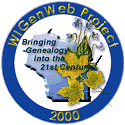

| From History of Dane County, Wisconsin, publ. by Western
Historical Company, Chicago, 1880, page 551-553 JOHN B. FEULING was born in the city of Worms, Germany, February 12, 1838. Until his tenth year, he was educated at the public school in his native city; he then attended the gymnasium, from which he graduated in 1857, with a first degree, afterward entering the university at Giessen to study philology. His studies there were interrupted by being called to serve in the army, but he soon returned and passed his public examination 1860. From this institution he received the degree of Doctor of Philosophy. He gave private instruction while at the university, and, after leaving the institution, he accepted a position in the Institute of St. Gowishausen on the Rhine, as teacher of Latin and Greek. Later, he spent two years at the Bibliotheque Imperiale, in Paris, mainly in the study of philology and in acquiring a conversational mastery of the French language. Dr. FEULING came to the Untied States in 1865, and, not long after, opened a French and German academy at Toledo, Ohio. Not succeeding in this undertaking, he came West, first giving instruction at Racine College in the classical languages, and then accepting a Professorship in the University of Wisconsin. Shortly after his accession to this professorship, he was invited to the chair of ancient languages in the University of Louisiana, at Baton Rouge, and visited that place on a tour of inspection. The position was held open for him one year, when he finally declined it, although his preference was for a professorship such as had there been tendered him. The position in the University of Wisconsin he continued to fill, with much credit, until stricken down by disease, which terminated his life March 10, 1878 - the second of the Professors of the university to die at the post of duty. At the time of his death, Prof. FEULING was a member of the American Philological Association and of the Wisconsin Academy of Sciences, Arts and Letters. To both he had contributed several papers. He published, soon after coming to Madison, an edition of the Poema Admonitorium of Phocyllides, prefacing the Greek text with an introduction in fluent Latin. He left several works in manuscript: "The Homeric Hymns," with notes; "Selections from Montesquieu," with notes and a glossary, intended as a French reading book; and "An Historical Outline of Germanic Accidence." He was a profound scholar. Teaching, with him, was not drudgery. He felt proud of his profession, and discharged his duty with a conscientious fidelity. President BOYD, of the University of Louisiana, writes: "I consider the loss of Dr. FEULING to be a national calamity. The announcement of his death brings sorrow here in the far South as in the Northwest. Wherever he was known (and scholars and men of intelligence all over this country knew him), there is a profound regret that the accomplished linguist and courteous gentleman is no more." Prof. WHITNEY, of Yale College, says of him: "I lament his death, regarding it as a painful and serious loss to philological science in America. I held for him a high respect and warm personal affection." Dr. FEULING has lectured before various colleges and educational associations. His pamphlet on the "Etymology of the Word Church," attracted the attention of eastern linguists. Prof. SCHELE DE VERE, of the University of Virginia, writes of it: "I have been reading it again with appreciation of the distinction the author had won for himself and the university of which he was so bright an ornament." Dr. FEULING's last address, "The Rhyme in Latin and Greek," was read by him before the philological convention at the John Hopkins University in Baltimore, 1877. He was a frequent contributor to leading periodicals of this country, and had been, for some years, associate editor of a literary journal published in his native city. From these columns is selected the following, which shows that, in his literary tastes, poetry was an essential element, and that he cultivated the field with marked success. [The transcriber of this biography has chosen not to include the lengthy poem here.] Dr. FEULING was a member of the American Oriental society, and was invited to address its members, but the invitation came too late. According to his expressed wish, he was buried in Forest Hill cemetery, near Madison, Wis., within sight of the city he loved so well, and the University, the scene of the labors of his active life. Transcribed and contributed to this site by Carol |
Last Update Monday, 07-May-2018 17:23:36 CDT
 |
WIGenWeb State Coordinator:
Tina Vickery WIGenWeb Assistante State Coordinator: Marcia Ann Kuehl Copyright 2010 by the WIGenWeb Team. All rights reserved. Copyright of submitted items belongs to those responsible for their authorship or creation unless otherwise assigned. |
 |